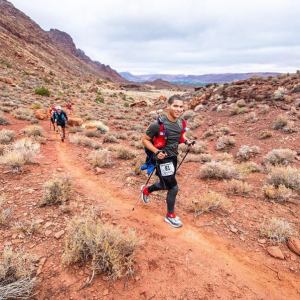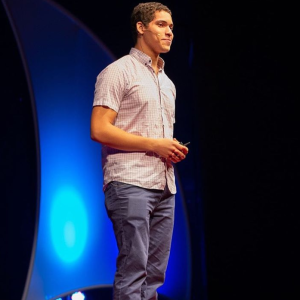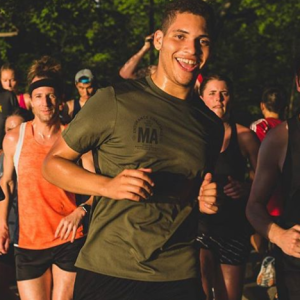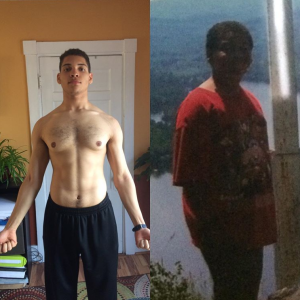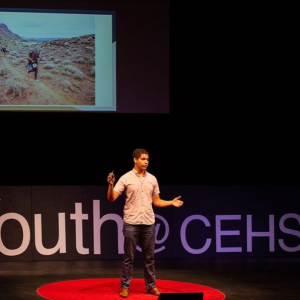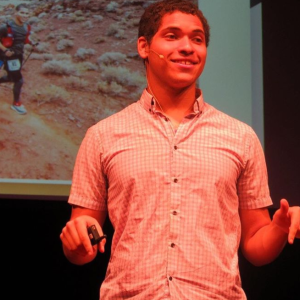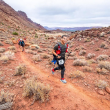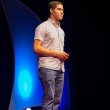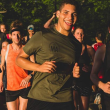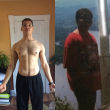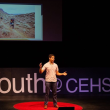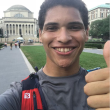Determined for success, Kaylo Littlejohn is leaving his mark on society
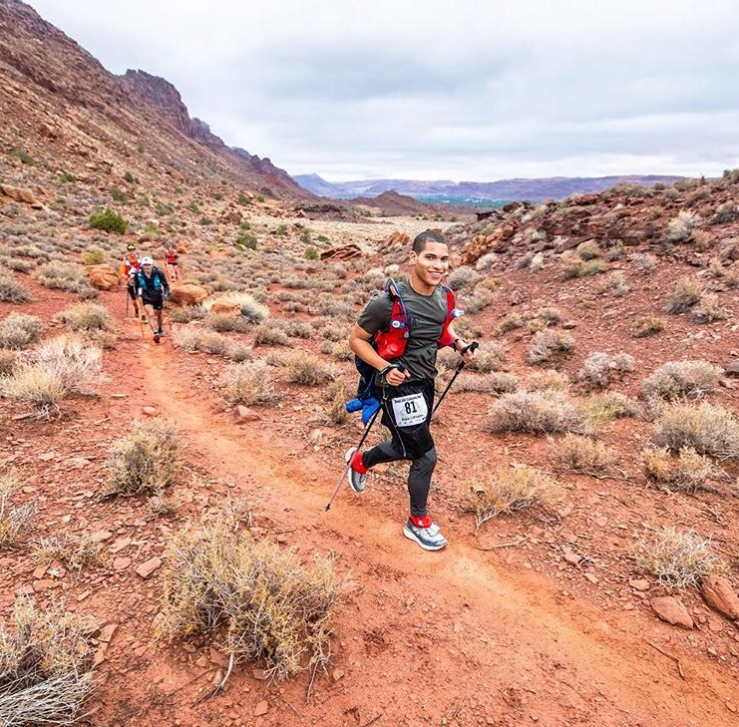 Kaylo Littlejohn during the Moab 240 mile endurance run. (Photo by Scott Rokis and Howie Stern)
Kaylo Littlejohn during the Moab 240 mile endurance run. (Photo by Scott Rokis and Howie Stern)
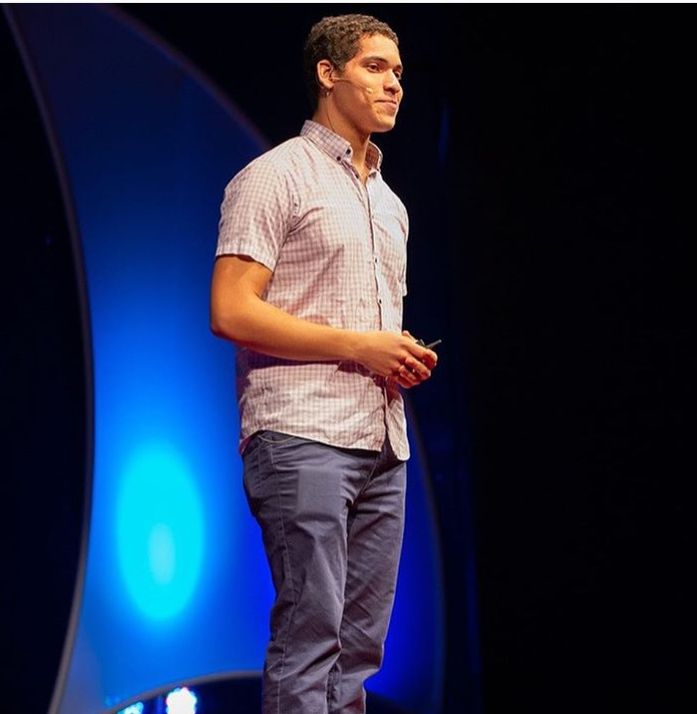 Kaylo Littlejohn speaking at a TEDx event. (Photo by TEDx Youth @ CEHS)
Kaylo Littlejohn speaking at a TEDx event. (Photo by TEDx Youth @ CEHS)
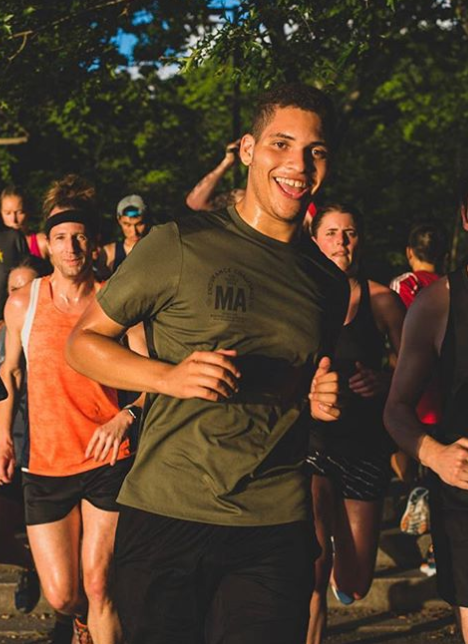 Kaylo Littlejohn. (Photo by Midnight Runners)
Kaylo Littlejohn. (Photo by Midnight Runners)
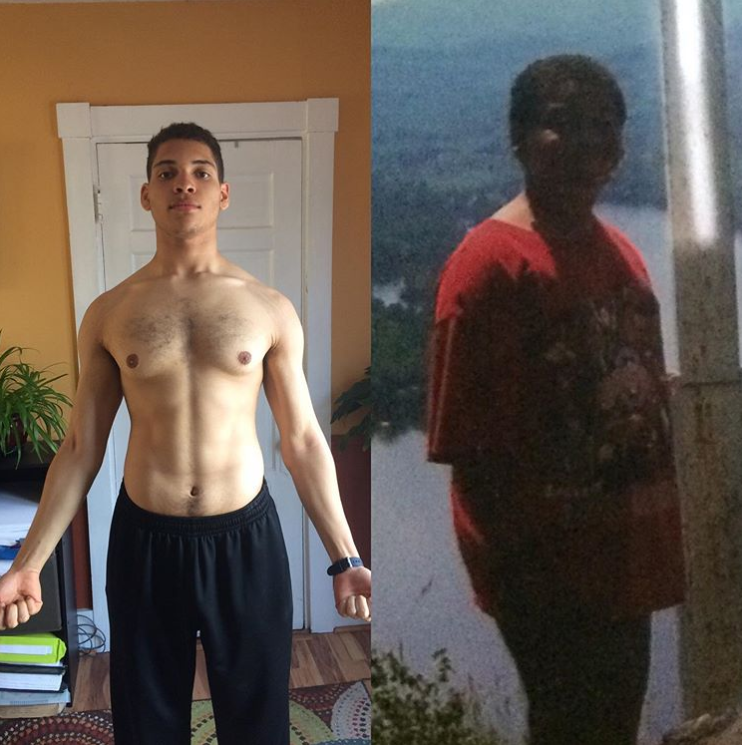 Kaylo Littlejohn at 195 pounds, left, and approximately 240 pounds. (Courtesy Kaylo Littlejohn)
Kaylo Littlejohn at 195 pounds, left, and approximately 240 pounds. (Courtesy Kaylo Littlejohn)
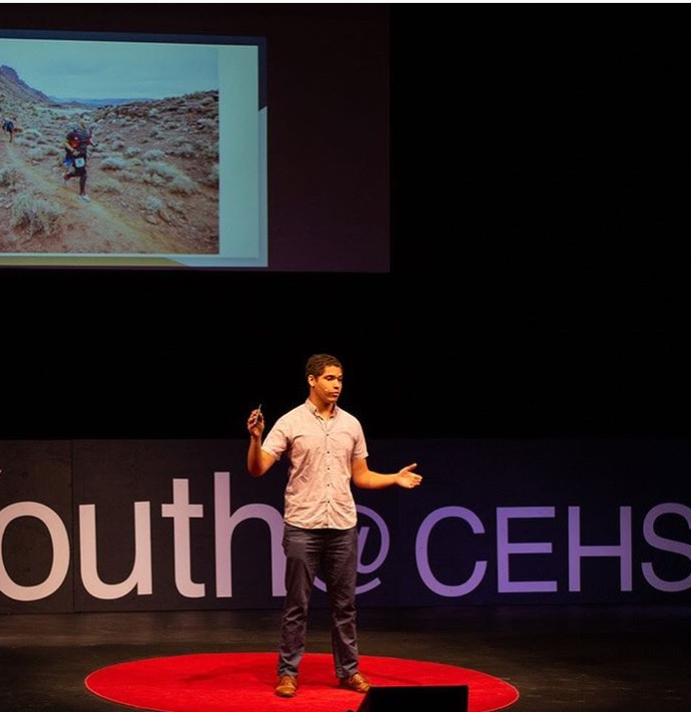 Kaylo Littlejohn speaking at a TEDx event. (Photo by TEDx Youth @ CEHS)
Kaylo Littlejohn speaking at a TEDx event. (Photo by TEDx Youth @ CEHS)
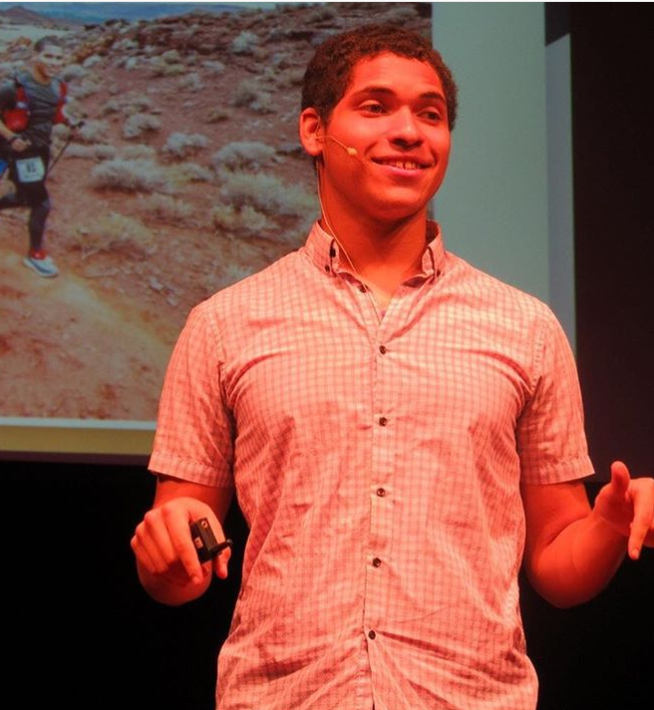 Kaylo Littlejohn speaking at a TEDx event. (Photo by TEDx Youth @ CEHS)
Kaylo Littlejohn speaking at a TEDx event. (Photo by TEDx Youth @ CEHS)
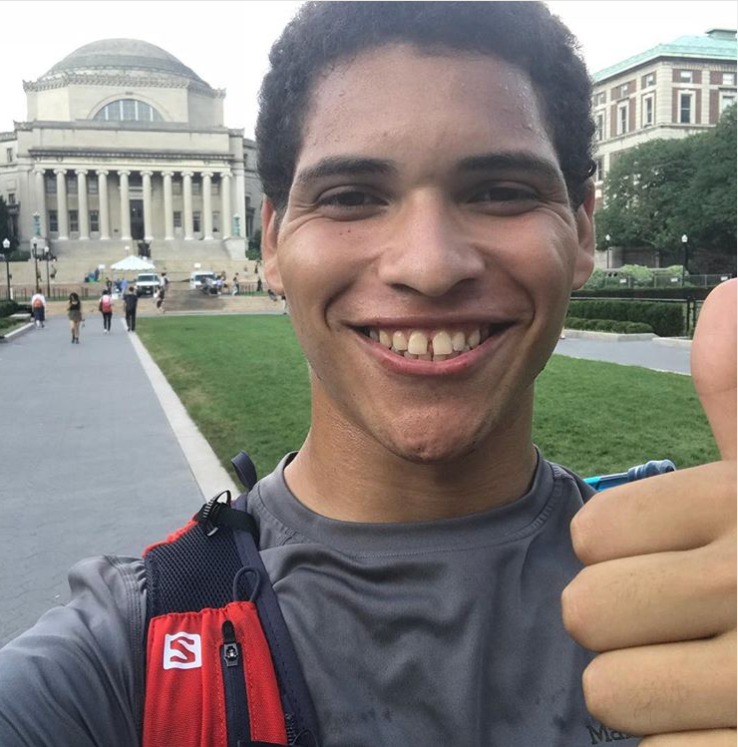 Kaylo Littlejohn at Columbia University after completing a marathon race. (Courtesy Kaylo Littlejohn)
Kaylo Littlejohn at Columbia University after completing a marathon race. (Courtesy Kaylo Littlejohn)
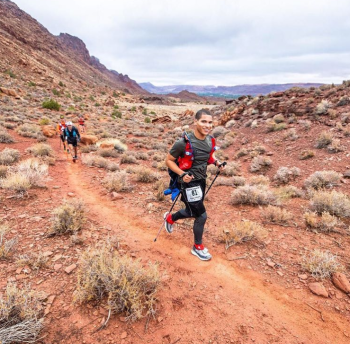 Kaylo Littlejohn during the Moab 240 mile endurance run. (Photo by Scott Rokis and Howie Stern)
Kaylo Littlejohn during the Moab 240 mile endurance run. (Photo by Scott Rokis and Howie Stern)
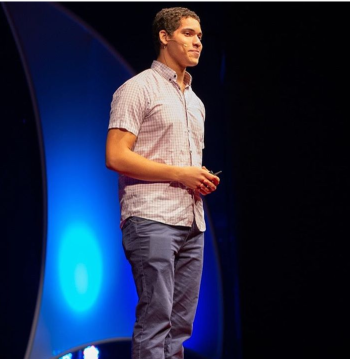 Kaylo Littlejohn speaking at a TEDx event. (Photo by TEDx Youth @ CEHS)
Kaylo Littlejohn speaking at a TEDx event. (Photo by TEDx Youth @ CEHS)
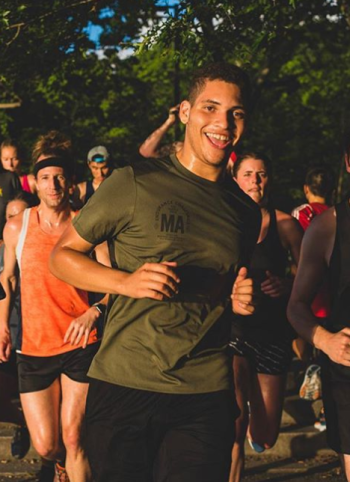 Kaylo Littlejohn. (Photo by Midnight Runners)
Kaylo Littlejohn. (Photo by Midnight Runners)
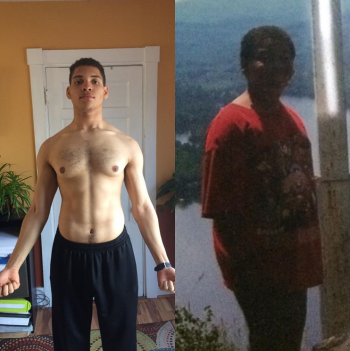 Kaylo Littlejohn at 195 pounds, left, and approximately 240 pounds. (Courtesy Kaylo Littlejohn)
Kaylo Littlejohn at 195 pounds, left, and approximately 240 pounds. (Courtesy Kaylo Littlejohn)
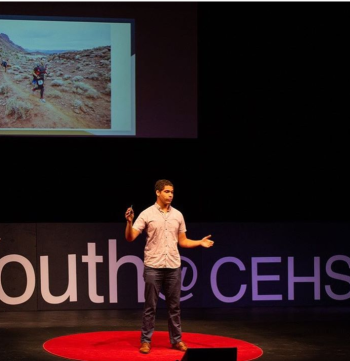 Kaylo Littlejohn speaking at a TEDx event. (Photo by TEDx Youth @ CEHS)
Kaylo Littlejohn speaking at a TEDx event. (Photo by TEDx Youth @ CEHS)
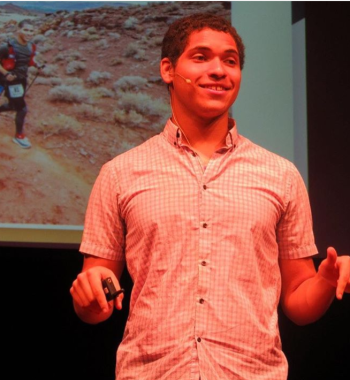 Kaylo Littlejohn speaking at a TEDx event. (Photo by TEDx Youth @ CEHS)
Kaylo Littlejohn speaking at a TEDx event. (Photo by TEDx Youth @ CEHS)
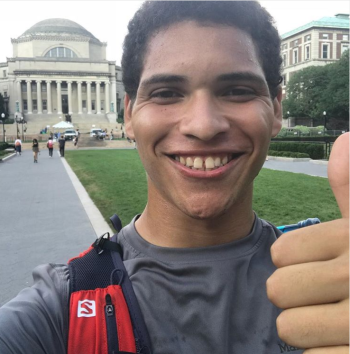 Kaylo Littlejohn at Columbia University after completing a marathon race. (Courtesy Kaylo Littlejohn)
Kaylo Littlejohn at Columbia University after completing a marathon race. (Courtesy Kaylo Littlejohn)
NEW YORK, N.Y. — For as long as he can remember, ultramarathon runner Kaylo Littlejohn has been plagued with obstacles in life and has, remarkably, endured each of life’s curve-balls to overcome unrelenting adversity.
Before attending school in the Midcoast, Littlejohn was told by an elementary school teacher, one that he considered his favorite and someone he looked up to, that he would either be dead, in jail or addicted to drugs by the age of 20.
He was placed into special education courses for seven years and, as he recalled in an interview, “endured unfathomable physical and emotional abuse at home.”
He remembers the days at school he would lash out and act up. He continuously moved schools after repeatedly being kicked out.
He was sent to a hospital and diagnosed with autism, Asperger syndrome, attention-deficit/hyperactivity disorder (ADHD), attention deficit disorder (ADD) and oppositional defiant disorder (ODD). He recalls being put on an abundance of medication and taking 17 pills a day.
At age 5, caregivers at the hospital placed him in a straight-jacket and in an isolated room to prevent him from causing harm to himself or others.
As if his mind did not already have enough to take-in and overcome, Littlejohn was overwhelmed by the time he reached high school by the issue of his weight.
In his early years as a student at Camden Hills Regional High School, Littlejohn weighed 285 pounds and had suffered a broken ankle.
“On the surface, I looked like a regular overweight kid,” he recalled. “I walked around and cracked jokes just like everyone else. In reality, I felt like garbage everyday. I felt extremely uncomfortable in my own skin and had major depression.”
He remembers gulping down a gallon of chocolate milk a day and consuming a minimum of one or two boxes of Hot Pocket sandwiches each morning.
“I hid my emotional eating patterns under the facade of ‘bulking up’ but deep down I knew the truth,” he wrote in a recent Instagram post looking back on his teenage years. “I didn’t eat because I was hungry, I did so because every gram of sugar numbed my mind for a few seconds to the fact that I was living a life of quite desperation.”
His determination to shed weight came via a way to feel better physically, mentally and emotionally, and also thanks to the encouragement of Patrick Kelly, Littlejohn’s biology teacher, driver’s education teacher and later his wrestling coach at Camden Hills.
“[Kelly] looked at me and asked if I would join the wrestling team,” Littlejohn recalled. “He said ‘you’re going to be a champion someday,’ and I believed him. That got my mind thinking about what could be possible because here I am with a broken leg and this man thinks I’m going to be a state champion.”
In fact, just prior to Kelly outlining his state championship vision to the teenager, who won the 2015 Class B state wrestling championship in the 195-pound division, Littlejohn had already envisioned life without all the unnecessary pounds.
“One day, I looked myself straight in the mirror and said: ‘Kaylo. You’re fat. This is not bulking up. This is you being a fat guy,’” he recalled in the aforementioned Instagram post. “It’s not a nice thing to say and I would never say this to anyone else, but sometimes we need to tell ourselves the cold hard truth in order to begin to take the necessary steps towards change.”
The fact Littlejohn successfully runs ultramarathons as an undergraduate college student is a stark contrast from his days at home in Camden, where he recalls not being able to walk a mile-long trail near his house.
Ultramarathons, he said, is “something that seems so [...] impossible to my prior self that if I knew what I would try to attempt to do I do not know if I would ever even started.”
Littlejohn learned of ultramarathons while listening to an episode of the Joe Rogan Experience podcast featuring David Goggins and Cameron Hanes, a pair of ultramarathon athletes, as guests.
“At first, [ultramarathons] seemed like something that could only be done by super humans or freak athletes, but then I did some research and found out apparently you can just sign up for these things,” Littlejohn recalled. “So that’s what I did; I made the decision immediately [to] go for the Moab 240 mile Endurance run. I strive to do things that push me past my previously conceived notions of what is possible for me. I knew I could do a 5k or 10k if I wanted to; but 100 or 200 miles? You gotta be out of your mind. Sign me up.”
Participating in ultramarathons since June 2018, Littlejohn has completed races ranging from 30 to 240 miles in Massachusetts, Pennsylvania, Utah, New Jersey and New York. He is scheduled to participate in a 30-hour run in Stratford, Connecticut on June 29 and in a 200-mile endurance run at Washington’s Mount St. Helens on Aug. 9.
One motivating factor for Littlejohn during the ultramarathons is his charity work. He has raised over $3,000 in a partnership with FNE International to support building a home for a family of five in Nicaragua.
His favorite ultramarathon was the 240-mile race in Moab, Utah, which he detailed in his TEDx talk at Cape Elizabeth High School, in a race filled with hallucinations (of bears, aliens, rednecks and other people and animals), dehydration, cliffs and rocky desert mountain terrain.
Littlejohn spoke at the December 2018 event since he believed he had a “powerful message to share with the world; not just of an incredible feat, but also where I came from and the long arduous journey it took to get there.”
WATCH: “Who we become in the act of trying” by Kaylo Littlejohn
When he graduated from the Rockport-based Camden Hills Regional High School, Littlejohn briefly trained at the United States Military Academy during the summer prior to his enrollment as a Division I wrestler at the academy.
Littlejohn, however, decided after boot camp it was within his best interests to move on from West Point and pursue other opportunities.
Those opportunities, however, were not easy to come by as one would hope.
“I was too embarrassed to even come home,” he recalled in an Instagram post last summer about the time he spent in Boston after leaving West Point. “I had zero dollars and it really sucked for a while.”
He remembers walking several miles through Boston’s south side during the winter, crying on the phone with parents and questioning whether he made the right decision to leave New York.
“There were a few moments where I thought I was going to end up another half homeless dude on drugs....,” he recalled in the post.
Despite those fleeting thoughts, Littlejohn said in an interview his will to turn out different deterred him from the dangers lurking in the shadows.
“I made a commitment to myself that if I was going to leave West Point, I’m not going to sit on the couch and smoke weed and play xBox,” he stated. “From the moment I left West Point I was going at life 100 percent to get back into school and create the type of life that I would be proud to show others.”
Deep down, Littlejohn recalled, he knew he had to leave Boston to find himself.
He spent approximately 40 days, over the following months, meditating in complete silence 17 hours a day, from 4 a.m. to 9 p.m., at free Vipassana Meditation Centers across the United States.
Eventually, Littlejohn found himself once again in New York, this time as an undergraduate student studying electrical engineering at Columbia University, after a two-year stint as a student at Boston’s Northeastern University.
At the Ivy League institution, Littlejohn is researching the creation of brain computer interfaces, something he has been drawn to since his sophomore year of college.
“It is a cutting edge area of science and engineering that is rapidly expanding,” he explained of his decision to pursue that field of study.
Littlejohn, who plans to pursue a doctorate degree after his 2020 graduation, is preparing to embark on a study on brain activity using brain computer interfaces, virtual reality and mediation.
Though not able to divulge many details about the study he is leading, Littlejohn noted he will be looking at possible effects of neurofeedback on the ability of humans to perform well on stressful and/or demanding tasks.
Asked what he ultimately wants readers to take away from his life story, Littlejohn is blunt: “I want readers to know that I’m nobody special.”
“I came from a very mentally challenging place in my life and my journey was not easy; and this is true for a lot of people,” he said. “Even those people who were raised on beautiful ocean front homes with tons of money and all the fancy lobster dinners they could possibly wish for still have serious problems; and if they tell you they don’t they are lying to you.”
Everyone, Littlejohn said, should know they are not alone in their struggles in life.
The power to rise above the struggles and one’s darkest hours is within each person, Littlejohn said, and one is able to take the pain, anger and frustration and channel that energy into achieving the seemingly impossible if one is willing to take an honest look at one’s self, where one is currently at and where one wants to be, and the steps needed to get there.
“I am an example of how someone who came from a dark situation can rise above their circumstances and achieve absolutely anything they set their mind to,” he stated.
Reach George Harvey at: sports@penbaypilot.com.
Event Date
Address
United States

